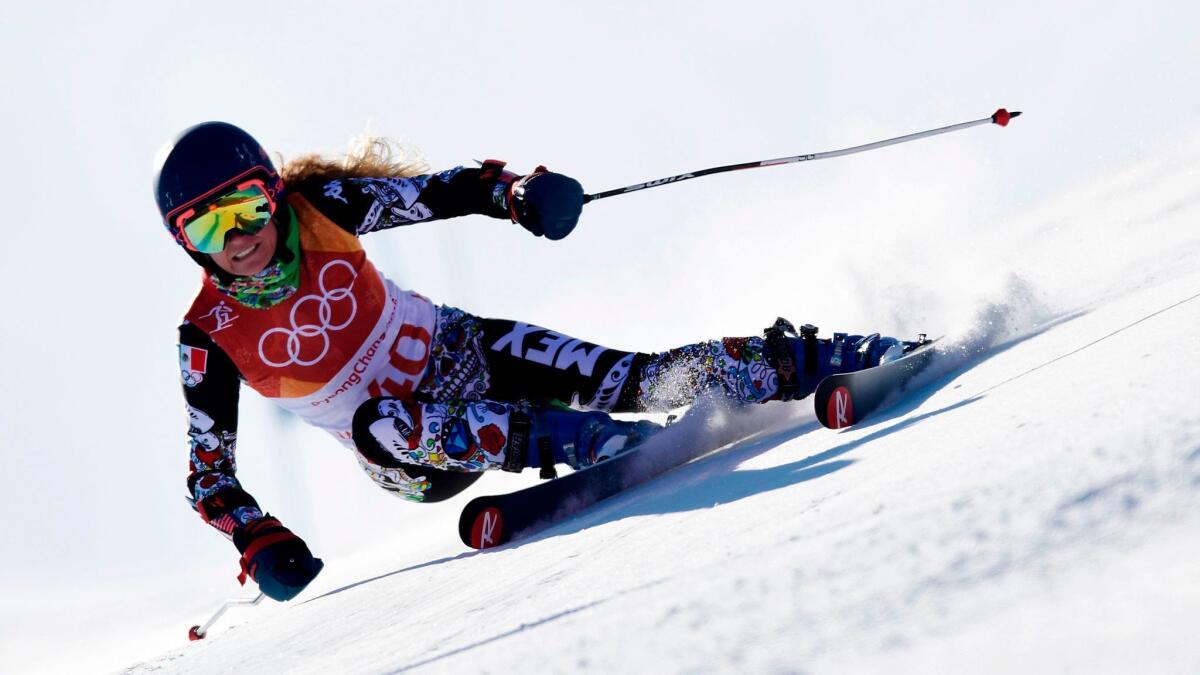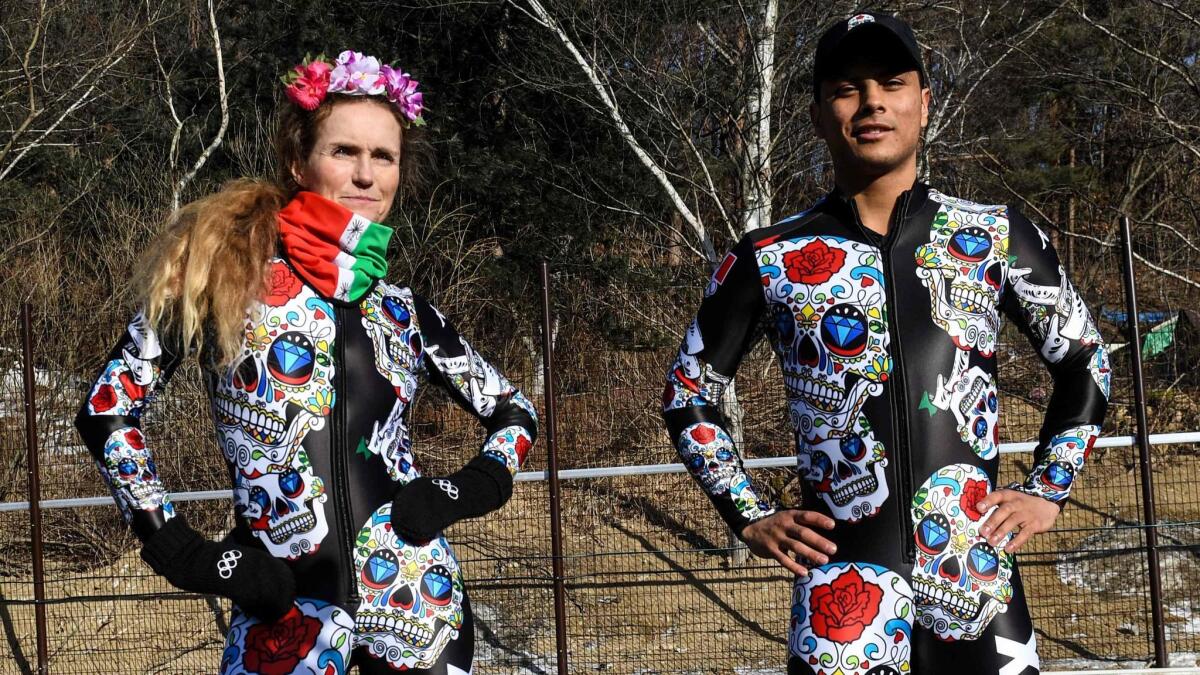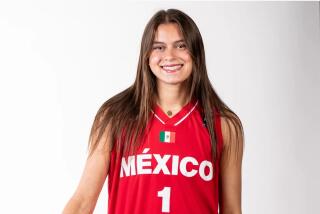Column: Mexico’s Olympic team has north-of-the-border flavor
Reporting from Pyeongchang, South Korea — Robert Franco was born and raised in Northern California, the son of a Mexican father and Caucasian mother. He looks white, and has forgotten much of the Spanish he spoke as a child.
But he does recall numerous trips to Jalisco and Guanajuato, the reunions with his tios and primos — uncles and cousins — in Puerto Vallarta. He played soccer. And Mexican food was always on the dining table of his family’s home.
“I’m American and I’m Mexican,” Franco concluded. “I’m both.”
A freestyle skier who will compete in slopestyle on Sunday, he has finished as high as sixth at the world championships. With dual citizenship, he had a choice to make between the United States and Mexico as to which nation he would represent in trying to qualify for the Olympics. As a U.S. athlete, he would have been a contender for one of the team’s four spots. As a Mexican, he was a lock — provided he reached the Olympic qualifying standard in his sport, which included a top-30 world ranking.
So, during the Olympics’ opening ceremony last week, Franco, 24, marched representing Mexico, his ancestral homeland. He is among dozens of athletes at these Games who are competing for a country other than the one in which they were born. The Olympics charter requires only that an athlete “be a national of the country for which he or she is competing.”
Some athletes switch because their adopted country can devote more training resources and opportunities to them. Others do because it’s the only way they can compete. Joining Franco on Mexico’s four-person Olympics contingent are two alpine skiers — one from the U.S., the other from Canada — who would not have made these Games without another option.
Sarah Schleper, 38, is a former four-time U.S. Olympian who became Mexican through marriage. Rodolfo Dickson, 20, was born in Mexico but adopted and raised by a Canadian couple. Their stories illustrate the different ways people can identify with a particular nationality or culture.
“I just always felt Mexican,” Dickson said.
Appearance was a factor. Orphaned at 9 months, Dickson was adopted by Barry Dickson and Dana Sommers, residents of the province of Ontario, when he was 3.
Dickson has no memory of the orphanage in Puerto Vallarta where they found him. He doesn’t know anything about his birth parents and isn’t particularly interested in finding out.
He doesn’t speak Spanish, and his exposure to Mexican culture was limited to family vacations in Puerto Vallarta, where his adoptive family owned property.
“With the accent, most of the people think I’m Canadian or American,” said Dickson, who will compete in the slalom and giant slalom on Sunday and Thursday, respectively. “But I do feel Mexican. I always did.”
His brown complexion made him stand out in school, just as it does at these Games, where the overwhelming majority of the participants are of European or Asian ancestry.
“I was always the Mexican guy,” he said.
Dickson was an elite performer on the junior circuit, but estimates he is about 10 years away from reaching his peak at the senior level. His Mexican citizenship, and passport, offered him an early entry to the Olympics.
A Mexican passport extended Schleper’s decorated international career. The Colorado native represented the United States at four Olympics, the first in 1998. She finished 10th in the slalom at the 2006 Games in Turin.
She can compete for Mexico because she married a Mexican citizen, real estate broker Federico Gaxiola de la Lama.
The idea of racing for Mexico was initially floated to her at the 2009 world championships by Hubertus von Hohenlohe. A descendant of a royal family that once ruled a principality in what is now a part of northern Germany, von Hohenhole was born in Mexico and represented the country in five Olympics.

Schleper’s husband was excited by the idea.
“Little did we know we wouldn’t get the passport for five more years,” Schleper said with a laugh.
She failed to obtain her Mexican citizenship and passport in time for the 2014 Olympics in Sochi, receiving it a month after the Games.
“When I got the email, I was so elated and overjoyed that I was a Mexican,” she said. “Who cares about the Olympics?”
Securing a passport as a naturalized citizen gave Schleper “a different kind of feeling and pride that comes with it. I wanted it so bad,” she said. “There’s nothing I wanted more than that passport. I was always in love with Mexico, the culture and the food and everything about it.
“I’m completely white and my accent in Spanish is really off, but I’m Mexican now.”
Her children, son Lasse and daughter Resi, already had Mexican citizenship because of their father.
“That was a big reason they gave me the passport,” Schleper said. “They were like, ‘We’re giving you the passport not necessarily because you’re married, but because you have Mexican children.’”
The biggest challenge to participating in these Games was that Mexico’s Olympic committee didn’t provide the athletes with financial backing. Schleper said her trip to South Korea was funded by family and friends. Dickson has relied on support from his mother to train full time. Franco worked in construction to keep his Olympics dream alive.

“I did plumbing, I’ve done roofing, I’ve done siding. I’ve done concrete,” Franco said. “I can pretty much build a house now.
“People say, ‘Oh, you’re taking the easy route by representing Mexico.’ There’s not been one easy thing about what I’m doing.”
Schleper was 39th after the first run in the giant slalom on Thursday. She failed to complete her second run.
Schleper said she wanted her participation in these Games to symbolize unity between the United States and Mexico.
“I feel my role here is to be a bridge between the two,” she said.
This could be the role of the entire team. Mexico’s flag bearer at the opening ceremony, cross-country skier German Madrazo, a 43-year-old from Queretaro, Mexico, who has lived in Texas for the last decade. Madrazo, who began skiing a year ago, finished last (115th) in the 15-kilometer freestyle on Friday.
Franco lived in Mexico City part-time last year and plans to return in the future.
“If I’m going to represent Mexico, I want to know the culture,” Franco said. “I plan on living in Mexico. I want to live and be Mexican.”
Franco said he is starting a salsa company and plans to sell products on both sides of the border. He also wants to increase skiing’s profile in Mexico, thinking that if he can win a medal that it might inspire someone in the country to build a dry or indoor facility.
“My plan is to win,” he said. “I have to win. I have more I can change and influence by winning than any other athlete in my discipline.”
Follow Dylan Hernandez on Twitter @dylanohernandez
More to Read
Go beyond the scoreboard
Get the latest on L.A.'s teams in the daily Sports Report newsletter.
You may occasionally receive promotional content from the Los Angeles Times.







